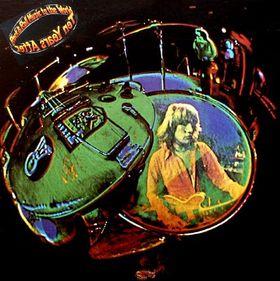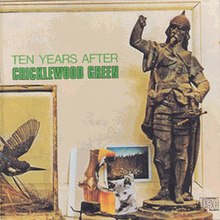
Obsession is the seventh studio album by English rock band UFO, released in 1978. This was the final studio album to feature Michael Schenker on lead guitar until he returned to the band in 1993. A single from the album, "Only You Can Rock Me" / "Cherry", was also released in 1978. So too was the band's first 3-track EP "Only You Can Rock Me", "Cherry" / "Rock Bottom", reaching No. 50 in the UK. The album was recorded at an abandoned post office in Los Angeles.

Why Can't We Be Friends? is the seventh studio album by American band War, released on June 16, 1975 by United Artists Records. Two singles from the album were released: the title track backed with "In Mazatlan", and "Low Rider" backed with "So". Both A-sides were nominated for the Grammy Awards of 1976.

Texas Flood is the debut studio album by the American blues rock band Stevie Ray Vaughan and Double Trouble, released on June 13, 1983, by Epic Records. The album was named after a cover song featured on the album, "Texas Flood", which was first recorded by blues singer Larry Davis in 1958. Produced by the band and recording engineer Richard Mullen, Texas Flood was recorded in the space of three days at Jackson Browne's personal recording studio in Los Angeles. Vaughan wrote six of the album's ten tracks.

Ten Years After are a British blues rock group, most popular in the late 1960s and early 1970s. Between 1968 and 1973, the band had eight consecutive Top 40 albums on the UK Albums Chart. In addition, they had twelve albums enter the US Billboard 200. They are best known for tracks such as "I'm Going Home", "Hear Me Calling", "I'd Love to Change the World" and "Love Like a Man".

Alvin Lee was an English guitarist, singer and songwriter, who was best known as the lead vocalist and guitarist of the blues rock band Ten Years After.

Pat Garrett & Billy the Kid is the twelfth studio album and first soundtrack album by American singer-songwriter Bob Dylan, released on July 13, 1973, by Columbia Records for the Sam Peckinpah film of the same name. Dylan himself appeared in the film as the character "Alias". The soundtrack consists mainly of instrumental music and was inspired by the movie itself. The album includes "Knockin' on Heaven's Door", which became a trans-Atlantic Top 20 hit.

Beaucoups of Blues is the second studio album by the English rock musician and former Beatle Ringo Starr. It was released in September 1970, five months after his debut solo album, Sentimental Journey. Beaucoups of Blues is very far removed in style from its pop-based predecessor, relying on country and western influences. A longtime fan of the genre, Starr recorded the album over three days in Nashville with producer Pete Drake and an ensemble of local session players. Beaucoups of Blues failed to chart in Britain but achieved moderate commercial success in the United States, where it reached number 35 on Billboard's Country Albums list and number 65 on the Billboard Top LPs chart.

Kiln House is the fourth studio album by British blues rock band Fleetwood Mac, released on 18 September 1970 by Reprise Records. This is the first album after the departure of founder Peter Green, and their last album to feature guitarist Jeremy Spencer. Christine McVie was present at the recording sessions and contributed backing vocals, keyboards and cover art, although she was not a full member of the band until shortly after the album's completion.

Book of Dreams is the tenth studio album by Steve Miller Band. The album was released in May 1977 on Capitol Records in the United States, Canada and Japan and by Mercury Records in Europe. Three singles were released from the album in 1977 with the first single, "Jet Airliner", being the most successful.

Piledriver is the fifth studio album by the English rock band Status Quo, released in 1972. It was the first to be produced by the group themselves, and their first on the Vertigo label. It peaked at number five in the UK and included several favourites that would be featured frequently in live concerts.

Steve Winwood is the debut solo studio album by blue-eyed soulster Steve Winwood. It was released in 1977, three years after the break-up of his former band, Traffic. Though the album sold moderately well in the US, it was a commercial disappointment compared to Traffic's recent albums, peaking at number 22 on the Billboard 200 album chart. In the UK, however, while Traffic's recent albums had only been moderately successful, Steve Winwood reached number 12 on The Official Charts. Island Records launched two singles from the album, "Hold On" and "Time Is Running Out", both of which failed to make the charts.

A Space in Time is the sixth studio album by the British blues rock band Ten Years After. It was released in August 1971 by Chrysalis Records in the United Kingdom and Columbia Records in the United States. A departure in style from their previous albums, A Space in Time is less 'heavy' than previous albums and includes more acoustic guitar, perhaps influenced by the success of Led Zeppelin who were mixing acoustic songs with heavier numbers. It reached number 17 on the Billboard 200.

Ssssh is the third studio album by blues rock band Ten Years After, released in 1969. The album charted #20 on the Billboard 200 and #4 on the UK charts.

Stonedhenge is the second studio album, and third album overall, by English blues rock band Ten Years After, released in February 1969 by Deram Records. It was recorded with producer Mike Vernon at London's Decca Studios in September 1968.

Watt is the fifth studio album by the English blues rock band Ten Years After, released in 1970. It was recorded in September 1970 except for the last track, a cover of Chuck Berry's "Sweet Little Sixteen", which is a recording from the 1970 Isle of Wight Festival.

Rock & Roll Music to the World is the seventh studio album by the English blues rock band Ten Years After, released in 1972. It includes several Ten Years After standards, including "Standing at the Station", "Choo Choo Mama", and the title track.

Positive Vibrations is the eighth studio album by the English blues rock band, Ten Years After, which was released in 1974. Shortly after the release of this album, the band broke up. The album peaked at #81 in the US Billboard 200 chart.

It Looks Like Snow is the third album by singer–songwriter Phoebe Snow, released in 1976.

"Love Like a Man" is a song and hit single by British blues rock group Ten Years After, first released in 1970 and taken from their album Cricklewood Green.

"I'd Love to Change the World" is a song by the British blues rock band Ten Years After. Written by Alvin Lee, it is the lead single from the band's 1971 album A Space in Time. It is the band's only US Top 40 hit, peaking at number 40 on the Billboard Hot 100 and was also a top ten hit in Canada.




















